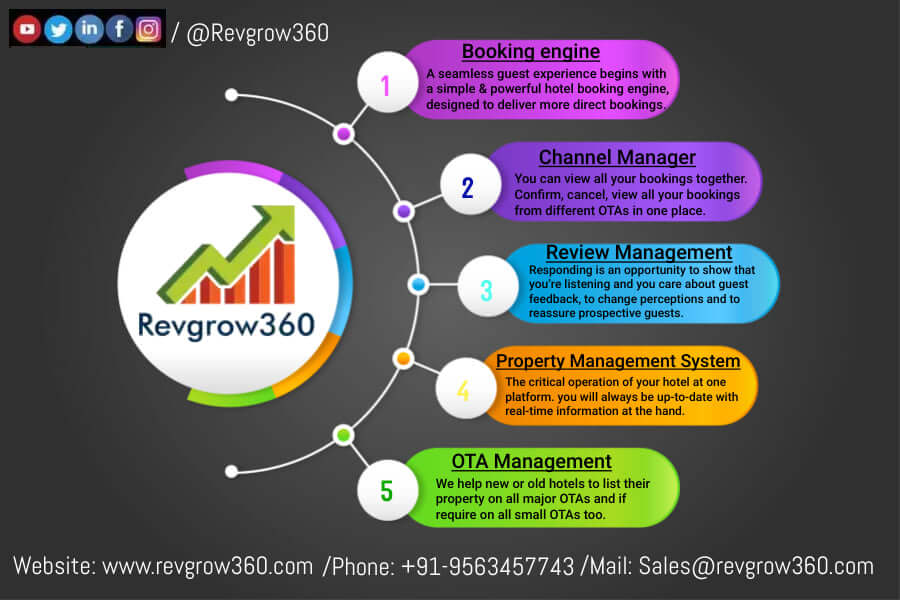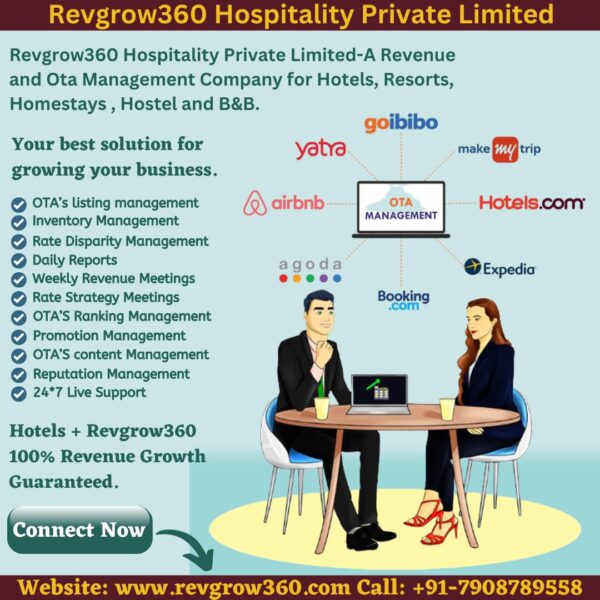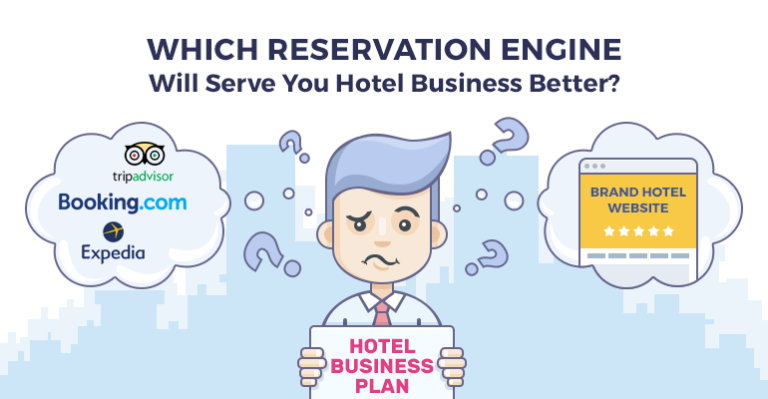Revenue Management Company In India Hotel marketing is something that needs to be handled only by experienced minds, it is a job that involves meticulous analysis at different levels. Hotel revenue management is another area that needs to be fully optimized when you want maximum profits without unnecessary squandering of money or resources. With pioneering solutions and bespoke applications, this is quite possible.
Revgrow360 is a hospitality sales & marketing company that lets you achieve all the goals you set for your hotel. We are not just another hotel marketing company that gives you an invariable course of action that involves some run-of-the-mill tactics. We believe in going above and beyond by reckoning your potential and elaborating it before your audience in an unparalleled way that ensures success.

The best Revenue Management Company In India
Revgrow360 Hotel Data Analytics provides simplified solutions to hotels to process data, make informed, accurate decisions and grow their business. We utilize our experience, the latest technology, and customer service to make data analytics and revenue management seamless for our clients.
What is hotel revenue management?
Revenue Management Company In India Revenue management is the process of using analytics — mainly supply and demand — to determine the right price for hotel rooms to maximize revenue and profitability. This category of software is also referred to as a “yield management system”, “pricing engine” or an “RMS”.
The primary goal is to sell the right product to the right customer at the right time for the right price on the right channel. Revenue management software ingests historical and market data combines this with forward-looking demand signals and recommends a rate for each segment and room type at your hotel, specific for each channel on which you are selling. Recently, modern software has moved from on-premise to cloud-based applications that are delivered as Software-as-a-Service, meaning multiple users can log in to the applications from anywhere they have an Internet connection.
Benefits of Revenue Management Solutions
- Accurate forecasting: An accurate forecast looks at all of the available data — past history and forward-looking data — to help hoteliers determine what their demand is going to be for every single day as far as 365 days into the future. Forecasts help each department in the hotel make smarter operations, marketing, and sales decisions.
- Create operational efficiencies: Automating your revenue management with a revenue management system means hoteliers no longer have to build spreadsheets and reports, calculate the demand by hand every day, and then enter those numbers into a spreadsheet and reporting system. This frees employees up for more strategic thinking around positioning their hotel in the market.
- Improve RevPAR: Revenue management software is designed to find your hotel’s optimal business mix, balancing occupancy and ADR to ultimately drive revenue per available room.
- Improve Net RevPAR / GOPPAR: More importantly, a modern revenue management system will place an emphasis on net revenue per available room, or RevPAR after operating costs like labour and acquisition costs are deducted. It’s critically important for hoteliers to focus on bottom-line profitability (gross operating profit per available room) as well as top-line revenue.
- RevPAR Index: Perhaps the most important metric, the RevPAR Index measures a hotel’s revenue versus its defined competitors in the market. If every hotel in the market sees revenue increases, the RevPAR Index will show a hotel how its revenue has changed in comparison with the comp set.
- Drive revenue: A revenue management system helps hotels determine how much to charge for their rooms each day. By accurately pricing hotel rooms based on real-time supply and demand data, hotels can drive average daily rate, revenue, and most importantly RevPAR Index.
- Forecast demand accurately: A good forecasting algorithm will be able to easily switch between long-term and short-term forecasts, to enable revenue teams to focus on the impact of exceptional events, such as COVID-19 on market demand.
If you are looking For A Best Revenue Management Company In India Connect With Us.
Key Feature Functionality– Revenue Management Company In India
Ultimately a revenue management system is designed to help revenue managers do 3 things: set and optimize prices, automate manual workflows, and leverage large data sets to enable complex decision-making with ease. Hotels that switch onto a revenue management system generally experience a RevPAR increase of between 5 – 20 % as a result of optimized automatic price-setting per room type.
Hotels that use revenue management systems save between 20 – 40 hours per month by streamlining manual workflows. An RMS also serves to visualize complex data sets into an easy-to-use and easy-to-understand user interface that saves revenue managers from difficult manual calculations and cumbersome spreadsheets.
Whether it pulling in thousands of records of historical data from your PMS, connecting to city-wide group demand data sets, or integrating rate shopping data from competitors —an RMS helps bring all of this data under one roof and deliver it in a simple way that helps revenue managers make more informed & data-driven decisions.
- Integrations – It’s important that your RMS integrates with your PMS, CRS, CRM, and booking engine with a reliable, two-way connection so that the systems can share the right data.
- Open Pricing – Your RMS must be able to price room types and channels independently of each other, rather than in lockstep with a set BAR price. For example, on some days you want your AAA rate to be 10% less than BAR, on other days you may want it 1% less than BAR.
- Cloud technology – An RMS that runs on multi-tenant cloud architecture allows your systems to integrate and share data more seamlessly and allows developers to push updates to your software in real-time. No more purchasing new versions of software just to get the latest features.
- Intelligent reporting – It’s important that your RMS be able to build, export, and share your most critical reports. Revenue teams must be able to share reports at the push of a button with management, ownership, and other departments within the hotel.
- Data Visualization – A good RMS not only presents your data in tabular reports but allows you to visualize your data and reports in graphical form. This allows revenue teams to better understand trends, outliers, and patterns in data.
If you are looking For A Best Revenue Management Company In India Connect With Us.
2023 Revenue Management Trends Best Revenue Management Company In India 2023
Cloud technology. The hotel industry needs to finally move away from legacy tech. The black box sat in an on-property server room or just tucked behind the front desk, which is no longer feasible. Cloud-based SaaS solutions enable hotels to deploy technology quicker, scale easier, and bring increased security, rather than running on a system that could be fallible to on-property power outages.
Price Agility. The consumer is more price-aware and savvy than ever before. Revenue teams need to pivot towards personalized pricing and targeted offers, yielding channels, segments, room types, and pricing rules such as MLOS independently to optimize every opportunity. Custom pricing rules will become the norm as revenue systems become more agile in their pricing methodologies.
Controlled automation. An automated pricing system that is either ‘on’ or ‘off’ is no longer relevant; we’ve seen this with the COVID-19 crisis. Revenue teams need an autopilot system that can be applied only in specific circumstances, such as for a long-term date range, at a committed occupancy level, or for a specific segment.
If you are looking For A Best Revenue Management Company In India Connect With Us.
What Integrations Does a Hospitality Industry RMS Need?
Property Management System A strong two-way integration with your Property Management Systems allows your RMS to pull historical information on rates and revenue, analyze the data and then return an accurate matrix of pricing recommendations for each segment and room type. Ultimately an integration with your PMS will enable more efficient revenue management automation to save time and improve results.
Central Reservations System A strong connection between the RMS and the CRS helps hoteliers avoid failed updates, lost reservations, and bad reports when data and files are not transferred accurately between the two systems.
Email Marketing and CRM An RMS-CRM connection is critical when hoteliers want to price based on a guest’s value to your property. Without this connection, hotels cannot price based on loyalty or past purchase behaviour. CRM systems rely on big data to efficiently segment guest profiles and revenue management system data is as rich as it comes.
Booking Engine – Without a connection between the RMS and the booking engine, the right recommended rates cannot be pushed to the guest at the time of booking.
If you are looking For A Best Revenue Management Company In India Connect With Us.
Hotel Revenue Management Software Implementation
Once the contract is signed and discovery is complete, the typical rollout timeline for a revenue management system is 8-12 weeks but some providers today are able to live in under one week.
Key Features of Revenue Management Software
1. Automation: With the push of a button, your price recommendations will instantly be reflected in your PMS. Neither analysis nor manual updates are required. Choose between accepting your recommendations one by one, in bulk, or even overriding specific recommendations with ease.
2. Price sensitivity chart: When setting the room price you need to take both internal and external data into consideration. The Price Sensitivity Chart is a graph illustrating the current optimal room price in relation to changes in revenue and occupancy rate. It helps you to make sure your price points are accurate.
3. Open pricing: Your RMS must be able to price room types and channels independently of each other, rather than in lockstep with a set BAR price. For example, on some days you want your AAA rate to be 10% less than BAR, on other days you may want it 1% less than BAR.
4. Pacing reports: Pacing reports help you always know your pace, down to pacing at a room-type level. You can compare your pacing with the reference arrival date of choice.
5. Data visualization and business intelligence: A good RMS not only presents your data in tabular reports but allows you to visualize your data and reports in graphical form. This allows revenue teams to better understand trends, outliers, and patterns in data. It’s important that your RMS be able to build, export, and share your most critical reports. Revenue teams must be able to share reports at the push of a button with management, ownership, and other departments within the hotel.
6. Group booking module: A Group Booking Price Module not only provides you with the current optimal group price but also a secondary price, which is the lowest price point you should accept because you would be better off, from a yield perspective, to sell the inventory on the open market instead.
If you are looking For A Best Revenue Management Company In India Connect With Us.
How does a revenue management system work?
A revenue management system analyzes a combination of competitor rates, historical rates, market dynamics, and inventory levels to predict demand and provide rate recommendations. A good revenue management system will automate the entire process and generate rates that can maximize revenue and profitability.
What are the tools of revenue management?
A revenue manager leverages tools like revenue management systems and rate shoppers to analyze competitor pricing and set a rate strategy that will maximize revenue. In addition, a revenue manager might study market trends in STR reports, analyze data in a business intelligence tool, and use promotional tools in their booking engine, PMS, or channel manager.
What is the main goal of revenue management?
The main goal of revenue management in hotels is to fill the right room at the right time for the right price. Revenue managers want to maximize the rate potential of each room night, but without setting prices too high that nobody will book.
What is the role of a revenue manager?
The revenue manager’s job is to manage pricing strategies to maximize revenue and profit. In a hotel, the revenue manager sets rates, deploys promotions, analyzes competitor pricing, and decides when to open or close certain rate plans or promotions. A revenue manager usually works closely with the sales and marketing departments.
What are the benefits of revenue management?
Revenue management enables the business to stay competitive in the marketplace by adapting prices to changes in supply and demand. Revenue management strategies ensure a business isn’t leaving money on the table by charging rates that are too low, or setting prices too high that nobody will purchase.

Revgrow360 is The Best Revenue Management Company In India.
If you are looking For A Best Revenue Management Company In India Connect With Us.




Pingback: What is the role of an (OTA) Online Travel Agency in the hotel business? - Revgrow360 What is the role of an (OTA) Online Travel Agency in the hotel business?
Really very great services and such a dynamic team members।
It is really one of the best Revenue and ota management company in india